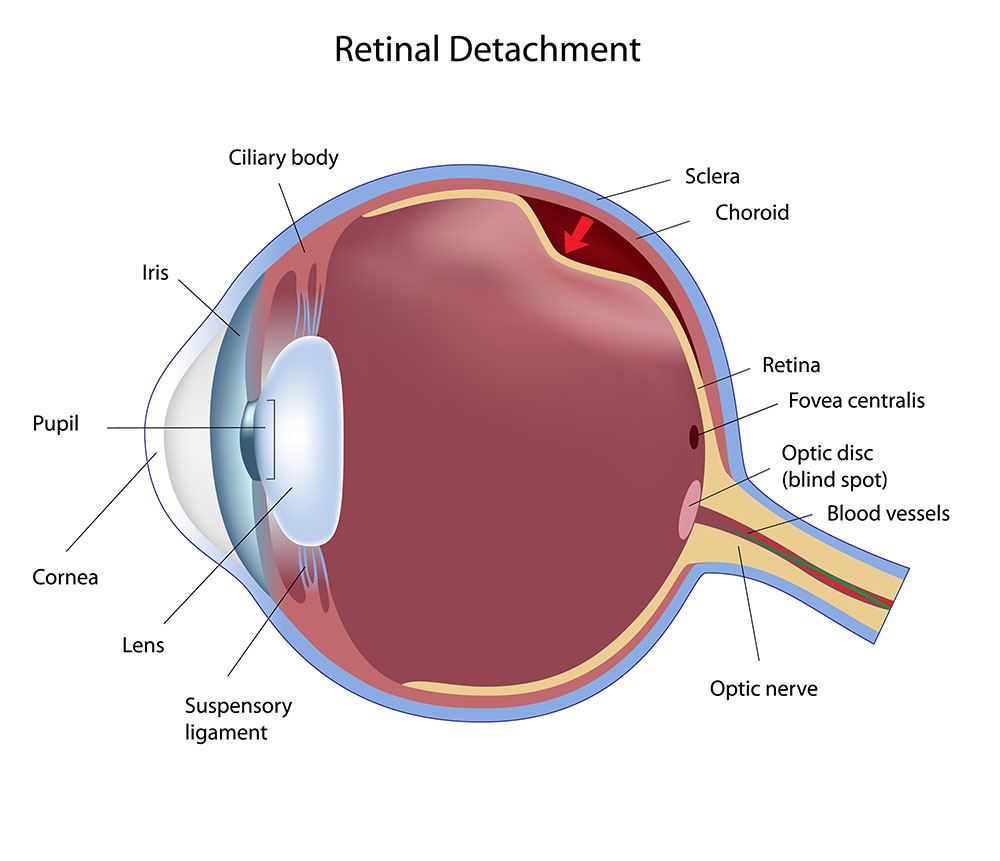A retinal detachment is a serious medical condition. At Grand Rapids Ophthalmology, we have a team of fellowship-trained retinal specialists to help diagnose and treat this problem. For patients, this means being in the best hands for treatment and technology. Retinal detachment is a serious condition that can endanger your vision.
What is a retinal detachment?
The retina is a thin, light-sensitive layer at the back of the eye that is instrumental in helping you see. The retina is connected to the back wall of the eye, where it connects with blood vessels. The blood vessels supply the retina with blood and nutrients. Retinal detachment is the term for when the retina separates from the back wall of the eye. When the retina detaches, it no longer gets the blood supply it needs from the eye.

What causes retinal detachment?
A retinal detachment can result from many causes. Depending on the cause, the detachment is usually classified as one of three types.
- Rhegmatogenous is the most common form of the condition. It most often the result of age. This form of retinal detachment results when there is a tear or a hole in the retina. Fluid can pass through the hole and gather under the retina. This can cause the retina to detach from the back wall of the eye and away from its blood supply and nutrients.
- Exudative detachment is often caused by age-related macular degeneration but can also result from an eye injury or tumor. There is no retina tear with an exudative detachment, but fluid can collect under the retina.
- Tractional detachment occurs in people with diabetes. Scars grow on the retinal surface and pull it away from the back of the eye.
What are the symptoms of retinal detachment?
If you have a retinal detachment, you are most likely to notice changes to your vision. Changes may include:
- Blurry Vision
- Many floaters. Floaters are the tiny dots or strings that seem to float in your vision.
- Slowness of side (peripheral) vision
- Flashes of light
- Curtain block or a shadow part of your field of vision
NOTE: Retinal detachment will not cause pain in your eye.
What should I do if I think my retina is detached?
Contact Grand Rapids Ophthalmology immediately if you experience these symptoms. Retinal detachment is an emergency situation. If you do not receive immediate treatment, you could suffer damage to your vision. Without proper treatment, you could lose your sight.
Grand Rapids Ophthalmology has ophthalmologists throughout Michigan who provide the timely care you need with a detached retina. Our two fellowship-trained retinal specialists, Dr. Yosef Gindzin and Dr. Parin Gohel are experts in treating the retina with advanced laser techniques, surgery, and drug therapy.
Who is at risk for a detached retina?
In some cases, a detached retina can be caused by an injury to your eye. There are clear risk factors for retinal detachments, including:
- Age. Individuals over the age of 50 have an increased risk of a detached retina.
- Family history. If someone else in your family had the condition, you are at a higher risk of also having a detached retina.
- Personal history. If you have had a previous retinal detachment, you are at a higher risk of another detached retina.
- Extreme Nearsightedness.
- Previous eye surgery, including cataract surgery.
How do doctors treat retinal detachments?
Doctors have a variety of techniques for treating retinal tears and detachments. If you have a tear that hasn’t resulted in retinal detachment, the doctor may perform an outpatient procedure. Your doctor could use lasers or cryopexy, a procedure that uses a freezing probe to repair the damage. Surgery will be required if your condition has advanced to a retinal detachment. Your doctor will recommend a specific surgery based on the cause of your retinal detachment. In some cases, a combination of procedures may be required.
If you’re looking for an eye care provider for retina related issues, it is vital to choose one that you trust. Grand Rapids Ophthalmology has been the eye care leader in West Michigan since opening in 1982.
With expert doctors and the most advanced technologies available, we are here for your eye care needs. Contact us to schedule an appointment at Grand Rapids Ophthalmology.
Schedule an Appointment
Schedule an appointment today to experience the GRO difference. Call 616.588.6598 or click here.





















